I again had the pleasure last Friday of appearing on France 24’s panel discussion week-in-review program, The World This Week. The other panelists were Tom Redubrun of the IHT, Stefan de Vries of RTL, and Laura Dagg of Toute l’Europe. Topics included the Iraqi elections, the Greek debt crisis, and U.S.-Turkey relations in the aftermath of the Armenian Genocide bill. Part one can be found here. Part two can be found here.
Global Archive
Free Newsletter

Last week, senior students at the Naval War College presented their Final Exercise briefs. In assessing how the world of 2030 will take shape, many drew on the National Intelligence Council’s report, “Global Trends 2025: A World Transformed,” particularly its assessment — as a “relative certainty” — that “a global multipolar system is emerging with the rise of China, India, and others.” This is the future everyone expects, but in order to determine what steps the United States should take now, in 2010, to mold and nudge how this future will unfold, we need to answer a fundamental question: What […]
In answer to an inquiry from a reader, my take on the Greece crisis is that the politics vs. economics dilemma is pretty thorny for everyone involved. (See Nicolas Nagle’s WPR briefing today for a great background on that.) But the stakes are too high to let Greece or the euro fail, and so eventually, everyone is going to have to bite at least part of the bullet to seal a deal. Everything going on right now is brinksmanship, with everyone trying to get the best deal possible for their particular interests. But a neglected part of the story here […]

In the wake of a major natural disaster, the narrative arc that subsequently unfolds has the potential to reshape the political landscape of the affected country. The script has been written and performed many times in many countries, with no two times ever exactly the same. After this weekend’s massive earthquake in Chile, keep an eye on the response from the governments — both the outgoing and incoming one — to see how the quake ends up altering that country’s long-term political picture. No matter where disaster strikes, the script opens with shock, heartbreak and compassion. Then, it inexorably moves […]

In the U.K.’s House of Lords on Feb. 3, members of parliament debated expanding Great Britain’s aid to the Democratic Republic of Congo, the site of several intersecting security and humanitarian crises. “Some 5 million people have died there since 1998,” said Lord David Alton of Liverpool. “It is the most deadly conflict since World War II.” Alton based his figure for Congolese war deaths on a widely cited 2008 report from the International Rescue Committee, which claimed that 5.4 million Congolese had died of war-related causes between 1998 and 2007. The causes included starvation, disease and combat between government […]
The time has come for the private sector and its activist stakeholders to move from “name and shame” to “know and show,” says United Nations Special Representative on Business and Human Rights John Ruggie. Ruggie is working to define roles and recommend operational parameters for his 3-pillar approach to business and human rights. The Harvard professor will present his final findings to the United Nations Human Rights Council in 2011. Many expect the council to formalize his recommendations and finally set an international standard for businesses in relations to human rights. “It’s a game changer,” Ruggie told a gathering of […]
